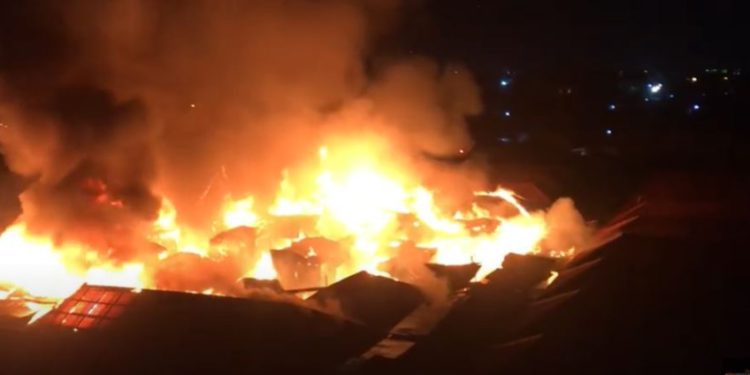Fire Outbreaks Will Continue as Long as Markets Remain Residential Areas – G/A Fire Commander

The Greater Accra Regional Fire Commander, ACFO II Rashid Kwame Nisawu, has expressed serious concerns about the ongoing fire outbreaks in markets across the country, emphasizing that such incidents will continue unless urgent action is taken to address the practice of vendors living, cooking, and storing hazardous materials within these trading spaces. His comments were made during a session at the JoyNews National Dialogue on fire safety in Ghana on Thursday, April 3.
ACFO II Nisawu pointed out that the transformation of markets into residential spaces is one of the primary reasons behind the frequent and devastating fire disasters in these areas. He explained that many of the markets in Ghana are not just commercial centers but also double as homes for the traders who work there. This dual purpose, he noted, dramatically increases the fire risk in these environments, as traders often engage in unsafe practices while living in the markets.
Vendors frequently light candles or mosquito coils to ward off insects while they sleep in the markets, a practice that can be dangerous when the flames are left unattended. The fire commander stressed that many traders are often unaware of the fire hazards around them as they sleep, making the markets a fire-prone environment. “People leave fires burning in their vicinity, and while they sleep, they don’t realize that a small flame can easily spread and ignite surrounding materials,” he explained.
This negligence, according to ACFO II Nisawu, is one of the major contributors to the numerous fire outbreaks. Unattended flames in markets have the potential to quickly ignite nearby products, which can lead to the rapid spread of fire, resulting in significant destruction. The fire commander made it clear that if this practice of using markets as both living spaces and trading areas continues, fire outbreaks will persist. “Until we dedicate markets strictly for trading and ensure that they are not used as homes for vendors, where people cook, sleep, and store flammable items, we will face ongoing fire challenges,” he warned.
Another critical issue identified by ACFO II Nisawu is the improper storage of flammable materials in markets. He cited a recent fire outbreak in the Adum area of the Ashanti Region, where explosions were observed as the fire spread. The explosions indicated the presence of highly combustible materials, which fueled the fire and made it more difficult to control. He noted that during some fire investigations, it was discovered that the very goods being sold in the markets—such as chemicals or other hazardous substances—played a role in escalating the blaze.
The fire commander emphasized that managing markets more effectively is key to preventing these fires in the future. He proposed a more structured approach to market management, which includes creating dedicated trading spaces where vendors would not be allowed to cook, sleep, or store flammable materials. This, he argued, would reduce the risks associated with fire outbreaks in these areas. ACFO II Nisawu also suggested that market regulations should be enforced more strictly, ensuring that only commercial activities take place in these areas, not residential ones.
Furthermore, he advocated for market segmentation as a way to minimize fire risks. By ensuring that vendors who sell similar goods are assigned specific areas within the market, it would reduce the likelihood of flammable materials being mixed with non-flammable ones. For example, he proposed that specific lanes should be designated for cloth sellers, while others should be reserved for food vendors or those dealing with highly flammable substances. This approach would help isolate potential fire hazards and reduce the overall risk of fire outbreaks.
ACFO II Nisawu concluded by urging all stakeholders, including market authorities, local governments, and traders, to take collective responsibility in ensuring that markets are safer. He stressed the need for improved infrastructure, better market planning, and stricter regulations to prevent further tragedies. He reiterated that a collaborative effort is needed to ensure that markets serve their intended purpose as commercial hubs and not as fire hazards that put lives and property at risk.






